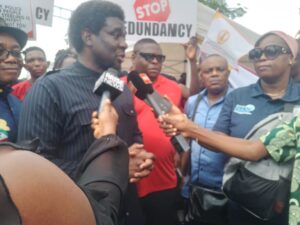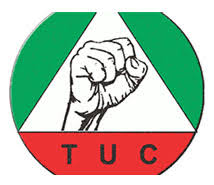IPPIS: Why NLC will no longer guarantee industrial harmony in higher institutions

The Nigeria Labour Congress (NLC) has warned the Federal Government that it will no longer guarantee in the higher institutions if all the grey areas involved with the Integrated Payroll and Personnel Information System (IPPIS) are not resolved.The NLC yesterday demanded an urgent stakeholders’ meeting of all relevant ministries and the affected trade unions to be convened immediately to resolve the challenges associated with the implementation of the IPPIS.
The NLC President, Ayuba Wabba,
in a letter to the Minister of Finance, Budget and National Planning, Hajia Zainab Shamshuna, warned that failure to do that, the NLC may not be able to guarantee industrial harmony in all the nation’s tertiary institutions if the foregoing concerns are not attended to and resolved immediately.
The NLC President noted in the letter that urgent steps must be taken to address other non-IPPIS issues of conditions of service of workers in the tertiary education sub-sector.
According to the NLC President, the Congress hosted a meeting of all its members in the educational sector which has challenges with the implementation of the Integrated Payroll and Personnel Integrated System.
The unions which includes, Non-Academic Staff Union of Educational and Associated Institutions (NASU); Senior Staff Association of Nigeria Universities (SSANU); Senior Staff Association of Polytechnics (SSANIP); Senior Staff Union of in Colleges of Education, Nigeria (SSUCOEN); National Association of Academic Technologist (NAAT); Academic Staff Union of Polytechnics (ASUP); and the Colleges of Education Academic Staff Union (COEASU) had earlier accepted the IPPIS platform.
Wabba said the challenges sssociated with the payment of salaries cut across non capturing of some staff especially those on study leave outside the country;
some who were captured on the IPPIS but not pay-rolled and henced have not received their salary since February 2020.
He said, “There are workers who were captured, and pay-rolled but are not being paid or are being paid less than what they should earn. Some of the specific nuances in this regard include:
Those captured, pay-rolled, and paid for only two months before the payments stopped; Those whose biometrics were captured but their names are still not on the IPPIS Portal; Existing workers who are tagged as “Ghost Workers”; Earned Allowances as approved by the 2009 Agreement are not captured on the IPPIS Platform; and Taxations are arbitrary and very high, sometimes reduce workers’ salaries to almost nothing.”
The Labour leader also identified delay in the payment of salaries as part of the challenges, noting that except for the month of May 2020, a pattern of delayed salary payment is being entrenched as salaries are now being paid on the 15th of the succeeding month.
Other challenges include Non-Remittance of Statutory Deductions (February to date), which cut across, taxes, National Housing Funds (NHF), Contributory Pension, Union Dues as well as non-remittance of non-statutory deductions for Staff Cooperatives.
The NLC President also added the Non-Payment of Consequential Minimum Wage Adjustment Arrears; Stoppage of the Payment of Sabbatical Allowance;
Non-remittance of statutory deduction from the payment of promotion arrears of 2013 – 2017 amongst others.
“These statutory dues were deducted but never remitted to the affected unions till date,” he said.
Wabba equally condemned the failure of the IPPIS System to capture the retirement age of workers in tertiary institutions as 65 years contrary to extant agreements and government circulars to that effect.
He said, “Honourable Minister, our affiliate unions have written several letters of complaint on the foregoing issues in the past seven months without any improvement.
“Given that the peculiarities in the education sector were not captured on the IPPIS platform, we write to demand your urgent intervention into the challenges and difficulties faced by our workers and trade unions especially those in the tertiary education institutions.
“Honourable Minister, we may not be able to guarantee industrial harmony in all our tertiary institutions if the foregoing concerns are not attended to and resolved immediately.”




